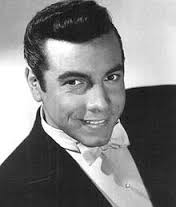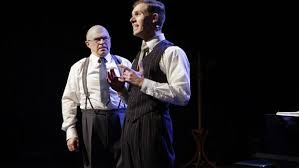Directed by
Richard Block.
Musical
Direction by Damien Slingsby.
Choreographed
by Rachel Thornton.
Presented by
Dramatic Productions.
Gungahlin College
Theatre until 11th June 2016.
Reviewed by
Bill Stephens.
 |
| Josie Dunham (Brenda) and Alexander Club (Frank Abagnale Jnr.) Photo: Kelly McGannon |
Following their
success with the Stephen Sondheim musical “Into The Woods”, Dramatic
Productions score again with the first Canberra performances of “Catch Me If
You Can”, a musical which premiered on Broadway in 2013.
Borrowing
the majority of the plot from the 2002 film of the same name which was based on
the diary of real life fraudster, Frank Abagnale Jnr., Terence McNally has
crafted an amusingly, pithy libretto in which Abagnale sees his life as a
Broadway musical in which he recounts details of his short career as a highly
successful con-man who managed to defraud victims of millions of dollars,
before, remarkably, settling down to work for the bank fraud department of the
FBI.
Director, Richard
Block has produced an assured and stylish production which successfully
captures the essence of the Broadway musical through imaginative use of the
relatively limited facilities of the Gungahlin College Theatre. The set design
is colourful and uncluttered, and successfully conjures up a variety of
locations, including an airport, a hospital, a variety of bedrooms and offices,
while allowing the show to flow seamlessly through the many scenes.
 |
| Alexander Clubb (Frank Abagnale Jnr) and ensemble Photo: Kelly McGannon |
The musical
numbers are excellently staged and performed, with Rachel Thornton’s
eye-catching choreography cleverly disguising any lack of detail in the set.
Damien Slingsby achieves a slick, professional sound with his excellent
orchestra, with a team of pit singers augmenting the on-stage ensemble.
Block has
been meticulous in putting together an outstanding cast. As Frank Abagnale Jnr,
Alexander Clubb carries the show on his slim shoulders, in a remarkably
charismatic performance that requires him to be on stage for almost the full
duration of the show. He sings eloquently, dances with aplomb, and acts
convincingly, and it does no harm that he bears an extraordinary resemblance to
Leo DiCaprio, who played the role in the film.
As Abagnale’s
nemesis, FBI Agent Carl Hanratty, whose obsession with capturing Abagnale leads
to the unlikely, though apparently factual, conclusion, Gerard Ninnes also
gives a compelling performance, and together they generate a real on-stage chemistry.
 |
| Jonathan Garland (Frank Abagnale Snr.) and Alexander Clubb (Frank Abagnale Jnr) Photo: Kelly McGannon |
Among the strong
cast, Jonathan Garland is outstanding as Abagnale’s alcoholic father, and
Janelle McMenamin is impressive as Abagnale’s French mother, Paula. Hayden Crosweller, Pierce Jackson and Andrew
Howes score as Hanratty’s trio of incompetent off-siders.
Michael
Miller and Debra Byrne provide delightful cameos as the parents of Abagnale’s
love interest, Brenda, who unwittingly becomes the instrument of Abagnale’s
downfall. Josie Dunham gives a
charmingly realised performance as Brenda, and almost stops the show with her
power-house rendition of the big second act ballad “Fly, Fly Away”.
Throughout,
the attractively costumed ensemble work tirelessly and enthusiastically to portray
a variety of characters necessary in the telling of the story, while Craig Muller’s
excellent sound design, which ensured that every lyric and line of dialogue was
heard with absolute clarity, and Hamish McConchie’s imaginative lighting design, were indicative
of the careful attention evident in every aspect of this outstanding production.
Catch it while you can.
 |
| Alexander Club with the air hostesses. Photo: Kelly McGannon |
This review first published in the digital edition of CITY NEWS on 29th May 2016.



















